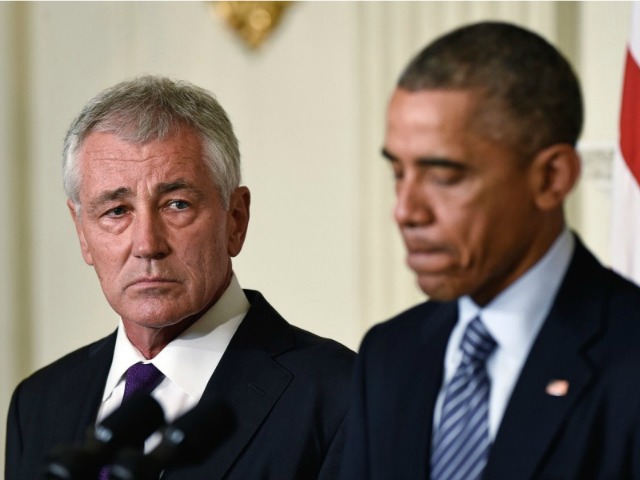President Obama professed today strong appreciation for the service of his third Secretary of Defense, Chuck Hagel. But if he was so appreciative, why exactly is Secretary Hagel about to be former Secretary Hagel?
Rumors are swirling as to whether Mr. Hagel was forced out or is leaving voluntarily. It’s a safe bet that the Secretary didn’t choose to relinquish, at this time, a job he had worked too hard to obtain and that Team Obama fired the President’s token Republican.
If so, the question is: For which of several possible reasons was he cashiered?
Some unnamed sources are claiming it was because of dissatisfaction over Hagel’s handling of the Ebola crisis and the U.S. military’s dispatch of forces to contend with it. Others report the White House has been unhappy with the mixed signals coming out of the Pentagon about the administration’s “strategy” for dealing with the threat posed by the Islamic State. The Secretary warned of its seriousness as the President was insisting that American combat forces would have to be reintroduced into Iraq.
Another possible explanation is that the administration may have tired of Chuck Hagel’s palpable dimwittedness. The White House wants to run the Pentagon from the West Wing and Executive Office Building and probably thought Hagel would be an empty suit who would not get in the way. Unfortunately, as became obvious when his nomination ran into fierce–and warranted–opposition (from, among many others, yours truly), the former Senator is inarticulate to the point of incoherence, an embarrassment as well as a liability to the President’s circle from which he had been assiduously excluded.
Given its timing, however, the most plausible reason for Secretary Hagel’s jettisoning may be his recent, highly public apostasy from the Team Obama line on nuclear deterrence. While the President has paid lip service in various official documents to the need to maintain nuclear forces that are safe and reliable, the truth that has been evident most especially to those charged with operating, securing and, if necessary, using such forces is very different: Mr. Obama is determined to rid the world of nuclear weapons, starting with ours.
After decades of benign neglect of the strategic “triad” and tactical nuclear arsenal by successive presidents of both parties, we have, under the Obama administration, reached a point where the failure to modernize obsolescing weapons–in some cases decades after their design-life ended–or to conduct actual underground explosive tests to ensure those in inventory still work has raised questions about the viability of our deterrent.
More immediately, Secretary Hagel confronted on his watch the effective demise of the industrial base that supports the nuclear weapons complex, the attrition of scientists and engineers with actual experience in designing and testing such weapons, and the plummeting morale and/or readiness of significant numbers of personnel responsible for manning the missile systems, bombers, and submarines on which they are deployed.
Such a hollowing out of the United States’ nuclear deterrent is consistent with a denuclearization strategy President Obama and Chuck Hagel have both espoused: “Global Zero.” The trouble is that, as Secretary of Defense, Hagel discovered that the practical effect of the White House-driven policies would entail effectively ridding the world of American nuclear weapons at the same time that all of our major enemies are building up theirs. In a number of cases, they have actually threatened the use of nuclear weapons against this country and/or its allies.
Therefore, Secretary Hagel felt constrained to try to staunch the bleeding. On November 14th, he announced a $1.5 billion infusion of funds to try to correct some of the most egregious problems with respect to maintenance, training, and operations. These are, however, bandaids whose effects will, at best, deal with some of the symptoms of the systemic problems afflicting our deterrent, unbeknownst to most Americans. Much more will have to be done to ensure the future safety, reliability, and effectiveness of our Triad, starting with a sea-change in the Commander-in-Chief’s truly irresponsible fixation with Global Zero.
My guess is that Chuck Hagel’s laudable effort–however inadequate–to keep the U.S. deterrent a going concern was seen as an unacceptable departure from the White House policy line–which seems far more interested in allowing the Iranians to get the Bomb than with ensuring we can maintain and modernize ours for the foreseeable future.

COMMENTS
Please let us know if you're having issues with commenting.